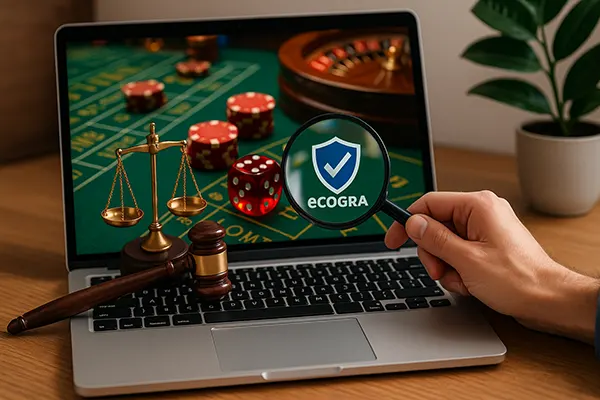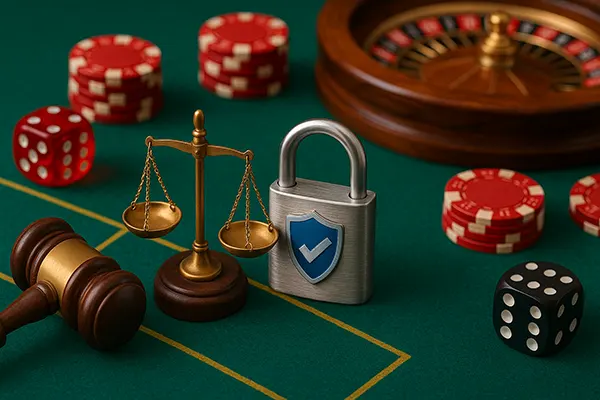
eCOGRA, MGA and Others: How to Independently Verify the Legality of an Online Casino
Before registering and depositing money at any online casino, it is essential to check whether it operates legally. In June 2025, hundreds of gambling websites continue to function without proper authorisation, putting players’ funds and personal data at risk. Fortunately, there are concrete ways to verify the legitimacy of a gambling site using international licensing authorities and certification bodies.
How to Check for a Valid Gambling Licence
One of the most important indicators of a trustworthy online casino is a valid gambling licence issued by a reputable authority. The most well-known regulators include the Malta Gaming Authority (MGA), the UK Gambling Commission (UKGC), and the Gibraltar Regulatory Authority. Each of these institutions sets strict standards for security, fairness, and responsible gambling practices. A valid licence ensures that the casino meets legal requirements and is subject to oversight.
To verify the licence, scroll down to the footer of the casino’s website. Reputable sites openly display the licence number and the name of the issuing authority. Clickable licence numbers often redirect to the regulator’s official database, where players can confirm whether the licence is active and valid.
Always cross-check this information by visiting the licensing authority’s official website. For example, the Malta Gaming Authority allows public searches of licensed operators via its “Authorised Companies” section, ensuring transparency.
Red Flags When Checking Licences
If a website claims to be licensed but doesn’t show the licence number or provides vague references (like “regulated by European law”), it is likely a red flag. Also, double-check logos: some rogue operators use fake licence icons copied from legitimate sources. If clicking the logo doesn’t lead to an external licensing page, consider it suspicious.
Another red flag is a licence from jurisdictions with limited oversight or weak enforcement. While some countries allow online casinos to register with minimal restrictions, these registrations offer little to no player protection.
Lastly, verify the date of licence issuance. Some sites list outdated or expired licence numbers to create a false impression of legitimacy. A current licence is crucial for ensuring legal operations.
What Is eCOGRA and Why It Matters
eCOGRA (eCommerce Online Gaming Regulation and Assurance) is an internationally recognised testing agency based in London. Established in 2003, it specialises in certifying online casinos and gaming software for fairness, integrity, and player protection. eCOGRA is approved by multiple licensing bodies, including the MGA and UKGC, making its seals particularly trustworthy.
If an online casino displays the eCOGRA Safe and Fair seal, it means that the site has undergone independent audits. These audits evaluate the fairness of games, effectiveness of customer support, and responsiveness to complaints. Casinos certified by eCOGRA are also committed to responsible gambling policies and data security standards.
Players can click the eCOGRA seal—usually located in the footer—to view the certificate on the official eCOGRA site. This page confirms the current status of the certification, the domains it applies to, and any limitations or conditions imposed.
How to Spot Fake Certification Seals
It’s crucial to ensure that certification seals, such as those from eCOGRA or iTech Labs, are real. Fake seals are sometimes copied and pasted onto scam websites without authorisation. Always click on the seal—authentic ones link to a certificate hosted on the certifier’s official domain.
If the link redirects back to the casino or shows an error page, the seal may be falsified. Additionally, search for the casino’s name directly on the certifier’s official website to verify the presence of valid certification. Never rely solely on images or logos without verification.
Lastly, check the certificate’s date and validity. Certifications are not permanent and require renewal. An outdated certificate may indicate the casino no longer complies with the necessary standards.

Independent Reviews and Public Blacklists
Aside from licensing and certification, another method to confirm an online casino’s legitimacy is by consulting trusted review websites and public blacklists. Independent gambling watchdogs regularly publish detailed assessments and maintain updated lists of unsafe operators. These resources combine expert testing with user reports to flag problematic sites.
Look for casinos that have a consistent history of positive reviews from reputable sources. Avoid those with multiple unresolved complaints, delayed withdrawals, or reports of manipulated games. Always read user comments in forums and review platforms to detect recurring issues before risking any money.
Several well-known platforms, such as Casinomeister and AskGamblers, provide blacklist databases and dispute resolution services. If a casino appears on one of these lists, it’s best to avoid it altogether—even if it holds a formal licence.
Tools and Sites That Help Verify Legality
Numerous third-party tools are available to assist players in verifying the legal status of gambling websites. These include domain reputation checkers, scam trackers, and databases of authorised operators. Most tools are free and only require the website address to analyse potential risks.
Websites like Trustpilot, Scamadviser, and the Better Business Bureau can also offer insights based on public feedback and fraud detection algorithms. Use these tools in combination with regulator databases for a more complete picture of the casino’s reputation and standing.
Always consult multiple sources when evaluating an operator. Relying on one tool or review can be misleading, especially if the site has invested in manipulating its public image. Cross-checking is essential for making informed decisions.
